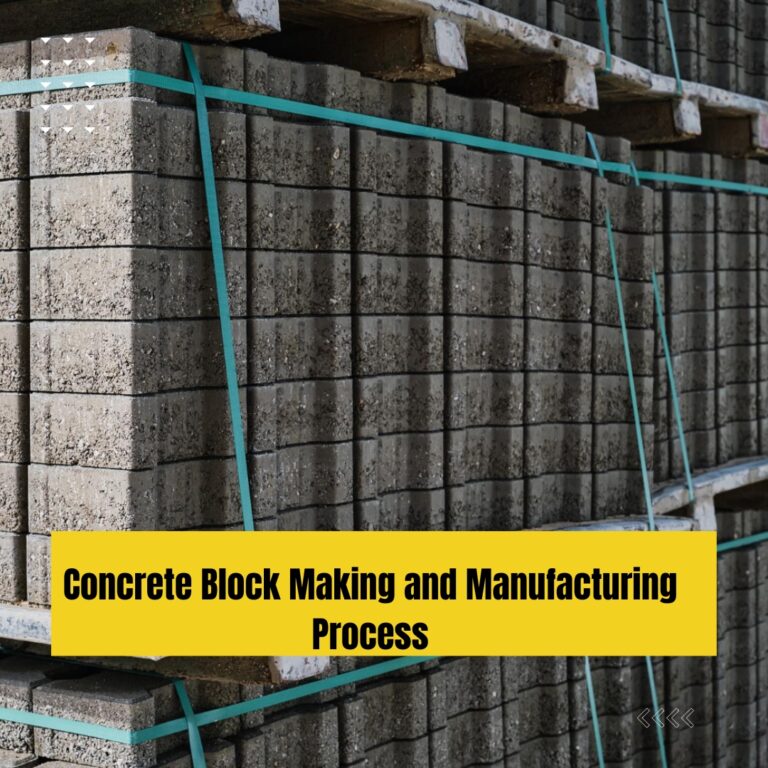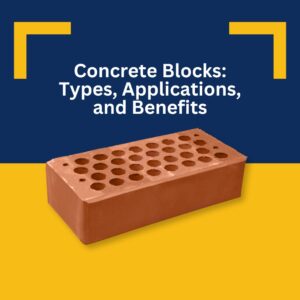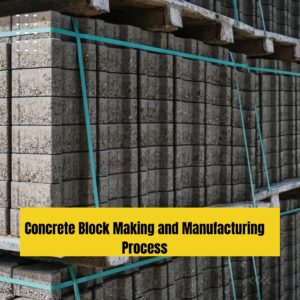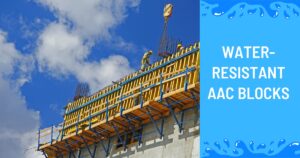Concrete block making and manufacturing process in Bangladesh involves mixing cement, sand, and aggregates, then molding and curing the mixture to create solid blocks for construction purposes. The process includes batching, mixing, molding, curing, and finally, quality control checks to ensure the durability and strength of the blocks.
The Bangladeshi construction industry relies on concrete blocks for building infrastructure and housing, making the concrete block integral to the country’s development needs. Concrete block making and manufacturing in Bangladesh is essential for the construction sector, enabling the production of durable and cost-effective building materials.
With increasing demand for quality housing and infrastructure, the process plays a vital role in meeting the country’s development requirements. The production involves several stages, from mixing raw materials to ensuring the blocks’ strength and durability, resulting in a valuable contribution to Bangladesh’s construction landscape.
Importance Of Concrete Block Making
Concrete block making plays a crucial role in the construction industry in Bangladesh. Let’s delve into the importance of concrete block making and how it contributes to the development of sustainable and durable structures in the region.
Strength And Durability: Concrete block offer superior strength and durability compared to traditional walling materials.
Cost-effectiveness: Concrete block provides a cost-effective solution for construction projects, reducing overall expenses.
Sustainability: Concrete block manufacturing promotes sustainability by utilizing resources efficiently and minimizing waste.
Types Of Concrete Blocks
Solid Blocks: Solid block are dense and sturdy, offering exceptional strength and durability for construction projects. The density of solid concrete block also contributes to their excellent thermal and sound insulation properties, enhancing the overall efficiency and comfort of a building.
Hollow Blocks: Hollow block is lightweight and versatile, ideal for reducing the overall weight of structures while providing good insulation properties. Their lightweight nature not only reduces the overall weight of structures but also offers excellent insulation properties, enhancing the energy efficiency of the building. Hollow block are not only lightweight but also incredibly versatile, making them a popular choice in construction.
Raw Materials For Concrete Block Making
When it comes to Making Concrete Block in Bangladesh, understanding the raw materials is crucial to ensure the production of high-quality, durable blocks. The raw materials used in this manufacturing process include cement, aggregates, water, and additives.
Cement: Cement is a vital component in the production of concrete blocks. It acts as a binding agent, providing strength and stability to the overall structure. In the manufacturing process, ordinary Portland cement (OPC) is commonly used due to its consistency and availability. OPC is made by blending clinker, gypsum, and other additives, resulting in a grey, fine powder.
Aggregates: Aggregates, such as sand and crushed stone, play a crucial role in the strength and texture of concrete blocks. These materials make up the bulk of the mixture, providing stability to the blocks. The combination of coarse and fine aggregates ensures a well-graded mixture that contributes to the durability and workability of the blocks.
Water concrete: Water is an essential ingredient in concrete block manufacturing, as it initiates the chemical reaction that leads to the hardening and setting of the cement. The right amount of water is crucial, as it affects the workability and strength of the blocks. The water used should be clean and free from harmful impurities to ensure the quality of the final product.
Additives: In addition to cement, aggregates, and water, various additives are often used in the concrete block manufacturing process. These additives enhance specific properties of the blocks, such as workability, durability, and resistance to weathering. Examples of common additives include plasticizers, accelerators, pigments, and air entraining agents.
In conclusion, the raw materials used in making concrete block in Bangladesh are cement, aggregates, water, and additives. Understanding the role of each ingredient and ensuring their quality is crucial for producing high-quality, durable blocks that meet the construction
Manufacturing Process
Concrete block making and manufacturing in Bangladesh involves a detailed manufacturing process that encompasses mixing and batching, molding and compacting, curing and drying, as well as finishing and packaging. Let’s explore each stage to understand the intricacies involved in producing high-quality concrete blocks.
Mixing and Batching: In this initial stage, various components such as cement, sand, gravel, and water are carefully mixed and batched in precise proportions to create the desired concrete mix. Quality control measures are implemented to ensure uniformity and consistency. During the first phase of concrete block making, a meticulous process unfolds as key ingredients like cement, sand, gravel, and water are methodically combined in exact measurements to form the ideal concrete mix.
Molding and Compacting: Once the concrete mixer is ready, it is molded and compacted using specialized machinery. The concrete mixture is poured into molds where it is compacted to remove air gaps and achieve the desired shape and density of the concrete blocks.
Curing and Drying: After molding, the concrete blocks undergo a crucial curing and drying process to attain the required strength and durability. Proper curing methods, including maintaining optimal humidity and temperature, are employed to ensure the blocks achieve their structural integrity.
Finishing and Packaging: The final stage involves finishing and packaging the concrete blocks. This includes removing any imperfections, applying surface treatments if required, and packaging the blocks for transport and storage, ready for distribution to construction sites across Bangladesh.
Technological Advancements
Bangladesh’s concrete block making and manufacturing process have seen significant technological advancements in recent years. These advancements have revolutionized the industry, making the production process more efficient and environmentally friendly. From the introduction of automated machines to the development of interlocking concrete blocks, technology has played a vital role in shaping the modern landscape of concrete block manufacturing in Bangladesh.
Semi-Automatic Vs Automatic Machines: The introduction of semi-automatic and automatic machines has transformed the concrete block manufacturing process in Bangladesh. Semi-automatic concrete block making machine require manual intervention at certain stages of production, while automatic concrete block making machine operate with minimal human interference, enhancing productivity and reducing labor costs.
Interlocking Concrete Blocks: Interlocking concrete blocks have emerged as a game-changer in the construction industry due to their superior structural integrity and ease of installation. The use of interlocking blocks in Bangladesh offers enhanced durability and earthquake resistance, ensuring the creation of sustainable and resilient structures.
Concrete Block Testing: The thorough testing of concrete blocks is crucial to ensure their quality and durability. In Bangladesh, strict adherence to quality standards and thorough testing procedures guarantee that concrete block products meet the industry’s performance and safety criteria, fostering trust and reliability among consumers and builders alike.
Challenges And Solutions In The Industry
Concrete block making and manufacturing industry in Bangladesh face various challenges that hinder smooth operations and profitability. However, these challenges can be effectively managed with proper solutions and strategies. Let’s explore some of the major challenges faced in this industry and their potential solutions.
Availability Of Raw Materials
The availability of raw materials forms a crucial challenge for the concrete block making and manufacturing industry in Bangladesh. The industry heavily relies on aggregates such as sand, crushed stone, and cement, which can sometimes face scarcity or fluctuating prices due to environmental regulations or other factors.
To overcome this challenge, concrete block manufacturers should consider the following solutions:
Diversifying raw material suppliers to ensure a consistent supply and avoid over-reliance on a single source.
Investing in alternative materials or adopting new technologies that can reduce the dependency on traditional raw materials.
Building strategic partnerships with local material suppliers to secure a stable supply chain.
Machine Maintenance And Repairs
Machinery breakdowns and maintenance issues can disrupt production schedules, leading to delays and increased costs. This poses a significant challenge for the making concrete block industry in Bangladesh. Regular maintenance and timely repairs are essential to keep the machines running smoothly and maximize productivity.
The following solutions can help address the machine maintenance and repair challenges:
Implementing a preventive maintenance schedule to identify and address potential machine issues before they cause major breakdowns.
Training and upskilling the workers on machine operation and maintenance to ensure proper handling and troubleshooting.
Maintaining a stock of critical spare parts to minimize downtime in case of unexpected breakdowns.
Competition In The Market
The concrete block making industry in Bangladesh is highly competitive, with numerous players vying for market share. This intense competition can pose challenges in terms of pricing, product differentiation, and market positioning.
Here are a few strategies to tackle competition and stay ahead in the market:
Focusing on quality control and ensuring consistent production standards to build a reputation for superior products.
Investing in research and development to innovate and offer unique concrete block designs or additional value-added services.
Establishing strong relationships with loyal customers through excellent customer service and after-sales support.
By understanding and effectively addressing these challenges, the concrete block making and manufacturing industry in Bangladesh can foster growth and profitability.
Future Outlook
Discover the future outlook of making concrete block in Bangladesh through an insightful overview of the manufacturing process. Explore the innovative techniques driving efficiency and sustainability in this evolving industry landscape. Uncover how the country’s construction sector is set to benefit from these advancements.
Future Outlook Innovations in making concrete block in Bangladesh is on the cusp of transformative advancements. Innovations are rapidly reshaping the industry while enhancing sustainability and efficiency. Market Growth and Demand The concrete block manufacturing sector in Bangladesh is witnessing a substantial surge. Market growth is being fueled by increasing infrastructural development and urbanization demands. Implementations of automation technologies are streamlining block production processes. Innovations like robotic machinery and AI controllers are ensuring precision and speed in manufacturing. Sustainable practices, such as utilizing recycled materials and eco-friendly additives, are becoming mainstream in the concrete block making industry. Increasing population and urbanization trends are propelling the demand for concrete blocks in Bangladesh. Market growth is expected to soar as the construction sector expands rapidly. With a future-oriented approach, the concrete block manufacturing industry in Bangladesh is poised for remarkable growth and innovation.
Frequently Asked Questions
To make concrete blocks, you’ll need cement, fine and coarse aggregates, water, and admixtures. These materials are combined in specific proportions to create durable and strong concrete blocks.
In Bangladesh, the manufacturing process of concrete products typically involves batching and mixing the materials, molding the mixture into block shapes, curing the blocks, and then packaging and transporting them.
To start a concrete block making business in Bangladesh, you’ll need to conduct market research, acquire the necessary equipment and materials, obtain the required permits and licenses, and develop a business plan and marketing strategy.
Conclusion
The concrete block making and manufacturing process in Bangladesh plays a crucial role in the construction industry. By understanding the steps involved in producing high-quality concrete blocks, builders and contractors can ensure the durability and structural integrity of their projects.
The use of modern technology and sustainable practices in this process is also paramount to promote a greener and more sustainable environment. With advancements in the industry, the concrete block manufacturing sector in Bangladesh has the potential for growth and development in the coming years.





